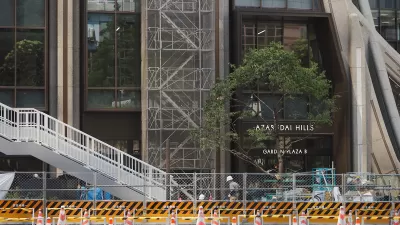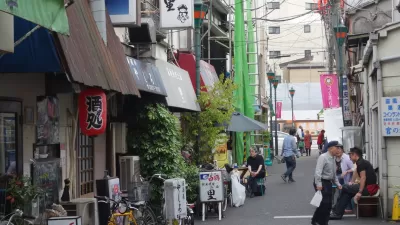Over the past 100 years, women-only train cars have come and gone in Japan. Daniel Krieger reports on why these subway cars have endured amongst women’s concerns for safety.
As Krieger recounts, Japan's women-only trains came into inception in 1912 to eliminate the dishonor caused by ogling men. This type of transportation has remained in favor, as concerns of mass transit groping have persisted over the years. However it's unclear how effective the segregation is in reducing groping incidents.
According to Krieger, "Even if the number of incidents goes down, with an uptick in women reporting them, the numbers could hold steady or even rise. This might explain why the number of annual groping arrests hasn't changed a whole lot since the trains were rolled out (around 4,000 cases per year nationwide, with roughly half in Tokyo, Japan's groping Mecca, where a survey found two-thirds of young women have been harassed on trains)."
Krieger notes that a change towards good behavior could better address these problems. "It looks like until Japanese men and women – but especially men – learn to behave themselves on trains in mixed company, completely gender-segregated cars might sadly be the safest way to ride."
FULL STORY: Why Women-Only Transit Options Have Caught On

Planetizen Federal Action Tracker
A weekly monitor of how Trump’s orders and actions are impacting planners and planning in America.

Map: Where Senate Republicans Want to Sell Your Public Lands
For public land advocates, the Senate Republicans’ proposal to sell millions of acres of public land in the West is “the biggest fight of their careers.”

Restaurant Patios Were a Pandemic Win — Why Were They so Hard to Keep?
Social distancing requirements and changes in travel patterns prompted cities to pilot new uses for street and sidewalk space. Then it got complicated.

Platform Pilsner: Vancouver Transit Agency Releases... a Beer?
TransLink will receive a portion of every sale of the four-pack.

Toronto Weighs Cheaper Transit, Parking Hikes for Major Events
Special event rates would take effect during large festivals, sports games and concerts to ‘discourage driving, manage congestion and free up space for transit.”

Berlin to Consider Car-Free Zone Larger Than Manhattan
The area bound by the 22-mile Ringbahn would still allow 12 uses of a private automobile per year per person, and several other exemptions.
Urban Design for Planners 1: Software Tools
This six-course series explores essential urban design concepts using open source software and equips planners with the tools they need to participate fully in the urban design process.
Planning for Universal Design
Learn the tools for implementing Universal Design in planning regulations.
Heyer Gruel & Associates PA
JM Goldson LLC
Custer County Colorado
City of Camden Redevelopment Agency
City of Astoria
Transportation Research & Education Center (TREC) at Portland State University
Camden Redevelopment Agency
City of Claremont
Municipality of Princeton (NJ)





























